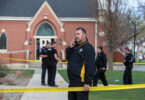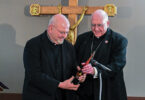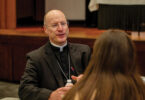
by Marc and Julie Anderson
mjanderson@theleaven.org
Overwhelmed. Unsure. Hesitant.
Those are just a few words Mark Schmitz, a member of St. John the Evangelist Parish in Lawrence, uses to describe how he felt when he began the annulment process more than 17 years ago.
Yet, he has never regretted his decision to seek an annulment. It provided him healing — healing he didn’t realize he desperately needed.
For Father Joseph Arsenault, SSA, the archdiocesan judicial vicar, helping couples heal from brokenness is what brings him joy in his particular ministry.
“Ultimately, that’s what we want it to be, a process of healing,” he said.
While he doesn’t always hear back from petitioners after annulments are granted, there have been occasions in which people have thanked him and the entire tribunal, saying the process has brought them healing, peace and closure. Some petitioners have even sent wedding pictures.
‘A very healing process’
Father Bruce Ansems, the associate judicial vicar and a judge of the archdiocesan tribunal, said he has found that the process of helping people heal from their brokenness can be quite fulfilling to him as a priest.
“I enjoy being an instrument of reconciling people to the sacraments of the church and helping them come to a better understanding of the beauty of the teachings and laws of the church,” said Father Ansems.
“The annulment process can be a very healing process for those who participate in it,” he continued. “I think when marriages end, the parties sense that ‘something wasn’t right’ . . . or was ‘not the way it was supposed to be.’ Most times the annulment process helps to confirm what they already sensed. It can help give closure.”
Father Joseph is a 20-year veteran of tribunal work — nearly his entire priesthood.
He tries not only to be an instrument of healing, but also works to dispel some of the common myths and misunderstandings about annulments and the process.
Father Ansems said dispelling these myths “can be difficult, because it’s like changing folklore.”
“I talk about annulments occasionally in my homily,” he said, “speak on it to people who invite me and try to make myself available to answer questions, whenever and wherever people have them.
“It’s kind of amazing at times how many people are just curious about the process and what it really means . . . even if they don’t need an annulment.”
Children are not illegitimate
Perhaps the most common misconception the two priests encounter is that an annulment means any children are illegitimate. Nothing could be further from the truth, said Father Joseph.
“The law states very clearly [an annulment] has no impact on legitimacy,” he said, adding both church and civil authorities agree on this point.
“When dealing with legitimacy,” he said, “you deal with it in terms of what [the relationship] had the appearance of at the moment when the children were born.”
A civil divorce, Father Joseph explained, does not take away any legal rights of the children. Whether the parents remain together has no bearing on the children’s property or inheritance rights.
“In the church,” he added, “we follow the same legal principles.”
Another misconception they encounter is that an annulment is the equivalent of a Catholic divorce.
“I think most people think that ‘it’s just a Catholic divorce,’ but a divorce dissolves a relationship that existed in a civil way,” Father Ansems said. “An annulment says the church’s understanding of marriage didn’t even exist at the time of consent, due to some known or unknown reason by the spouses.”
According to Catholic Church teaching, an annulment is “a declaration by a church tribunal that a marriage thought to be valid according to church law actually fell short of at least one of the essential elements required for a binding union.”
And it is possible to get a negative decision.
Annulments don’t cost anything
One final misconception that often arises in annulment cases, the two priests said, is the issue of cost.
“One of the old misconceptions is . . . that it costs a lot. Well, it never did,” said Father Joseph.
“There has never been a requirement of payment for an annulment,” he added.
Until recent reforms by Pope Francis, the church sometimes asked for a donation based upon how much time it took to process the case. For example, if it took $1,000 to process a case given the amount of time and paperwork involved, the church might have asked for a donation of $500, saying it “would be greatly received if you can afford it.”
The emphasis though, Father Joseph said, was on affordability. If someone simply could not afford it, the case was still handled.
“If you said, ‘I’m strapped and I really just cannot afford it,’” the case still went to judgment, he explained.
The reason the church used to ask for donations is because, like civil courts, the tribunal still spends a lot of time and resources processing a case. But, again, Father Joseph said, no one should have ever been turned away due to their inability to offer any donation.
Nowadays, Father Joseph said, donations are no longer even mentioned. That was a change instituted by Pope Francis in 2015 as part of reforms made to the annulment process.
“He mandated annulments are to be totally gratuitous. So, we have stopped even asking for the donation,” Father Joseph said. “We make it clear that people are free to give if they so desire, but we don’t ask for anything specific.”
Another misconception, Father Joseph said, is that sometimes people think they can prevent an annulment.
“That’s not the case. The case is judged objectively,” he said. “It’s not based on both parties being in agreement.”
Both parties have a right to be involved
Father Ansems said sometimes one of the main reasons people don’t seek annulments is because they don’t want to “rock the boat.”
“They find themselves having reached a level of civility with their ex-spouse and are afraid that by seeking an annulment they will cause unnecessary strain in an already stressful relationship,” he said.
Father Joseph agreed, but emphasized that once one party starts the annulment process, both parties have a right to be involved. After all, he said, someone cannot get a divorce without the other’s involvement. The same is true of the annulment process.
Often, in cases in which the petitioner didn’t want the former spouse involved, it would turn out the former spouse had provided information critical to providing a declaration of nullity, he said.
Another common frustration people sometimes associate with the annulment process is the length of time involved in filing the petition and waiting for the decision — as well as the depth of information collected.
“At times, it was overwhelming,” Schmitz said, although he recognized even at the time that all the questions were important to the tribunal being able to make a just determination.
“They needed to ask questions,” he said. “The key is: I was giving information so the tribunal could make a determination.”
Schmitz said he received “a lot of assistance and help” from family and friends in order to “get all the information to the tribunal to render a just judgment.”
The assistance came in the form of witness statements from family and friends who knew him and his first wife.
“I never knew what they wrote on their statements nor do I need to,” he said.
What he does know is that honesty and truthfulness are integral to the entire annulment process. He also learned the value of patience in waiting for the tribunal to complete it.
The whole process, he said, took about a year.
“It’s a process to go through,” he said. “It was a healing process. I didn’t know that at the time, but I know that now as it provided closure to that chapter of my life.”
Without going into too many details, Schmitz said his first marriage officially ended in 1994 and after 11 years, when his first wife simply decided she didn’t want to be married any longer.
“I just let her go,” he said. “Turned out way better than I imagined.”
For years, Schmitz said he went to Mass wherever he found himself. However, he didn’t join a parish and definitely did not avail himself of the grace of confession.
He admits he thought he’d failed at his one and only chance at marriage. After all, he reasoned, the Gospel specifically prohibits divorce.
“Even though I didn’t ask for [the divorce], I just assumed it was my one-time chance,” he said. “I screwed up, and I didn’t really deserve another chance.”
Around 2003, at the encouragement of friends, Schmitz returned to confession for the first time in 17 years and began the annulment process.
Ultimately, Schmitz was grateful for the second chance. Not only did the annulment free him from his past, but he was to get his happily-ever-after ending with his wife of nearly 15 years.
“It’s amazing we’ve been married that long,” he said. “It turned out way better than I could have ever imagined.”
Like Schmitz, Shelli Burdiek, a member of St. James Parish in Wetmore, found the process to be one of healing.
In 2012, Burdiek was enrolled in formation classes to join the Catholic Church. Having been raised in the Methodist and Presbyterian traditions, she did not completely understand the process at first, but credits Father Greg Hammes for being the ultimate father figure who walked beside her every step of the way.
“He told me I needed an annulment,” she said. “I said, ‘OK. Tell me what I need to do.’ He helped me through that process. He was already walking me through everything else.”
In fact, when her annulment was finalized about a year later, he came back to the parish to preside at her wedding to her husband Ryan.
Although the process took some time, Burdiek said she found it to be helpful and healing.
“A lot of it involved research that confirmed everything that I was saying, as well as the reason for my divorce. It affirmed I got divorced for the right reasons and not because I wanted to,” she said.
Many people, she felt, seek divorce as an “escape mechanism” instead of trying to work through issues, but Burdiek didn’t think she had done that.
It provided her a great deal of healing and peace to know the church agreed.
And she has some advice for those considering an annulment.
“You shouldn’t be scared,” she said. “Don’t judge the process before you go through it. You’ve got to actually experience the process before you can judge it.
“You’ve got to let it do its thing and see where it takes you.”
For more information about the annulment process or to start the process, contact the pastor of the parish in which you are registered.






